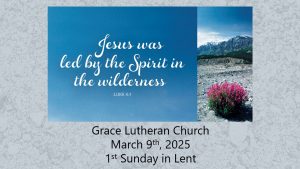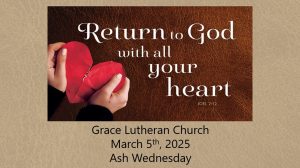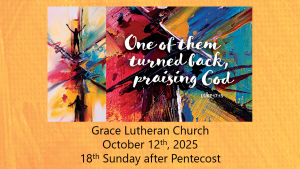Hi everyone,
Welcome to worship for this 2nd Sunday of Easter, which lands on April 27th, 2025! The service will go live at 10am PT.
The bulletin for this service can be found here. You can use it to follow along with the service, as it has the order of worship, the words of the liturgy, and the full sermon manuscript. Alternatively, you can follow along with the words that will appear on your screen, and the sermon is also on this page below the worship video.
For a fuller worship experience online, you are invited to have a lit candle in your space. You can extinguish your candle when the altar candles are extinguished near the end of the service after the sending hymn. You are also welcome to participate in communion if you are comfortable by having something small to eat and drink prepared. Further instruction will be given at the appropriate time.
May God’s unending love and peace be breathed on you, this day and always!
God of life, breathe on us today your Spirit, your Word, and your peace, through Jesus Christ. Amen.
Undoubtedly you have all heard about the passing of Pope Francis earlier this week. What you might not have heard (because I know that I never heard, at least), is that there were a lot of mixed feelings about this particular pope, amongst the Catholics and otherwise. In that while he was pretty popular for many and various reasons, a lot of the comments and sentiments I was reading online displayed some distain for him and his ministry. I guess that is just a given with someone in the public eye, seeing as how not even Jesus could get everyone on the same page about him, I just didn’t know that it was as bad as it was for Pope Francis.
Granted, I don’t exactly follow news around the pope very closely, but I admit that I was a little shocked and a bit dismayed that our fellow Christians, or anyone for that matter, could ever dislike him.
I don’t know, maybe I’m showing my colours a bit too much here, but I just didn’t see what there is not to like about him. Ok sure, I get that he didn’t exactly fit the typical and traditional “pope mold” that we’re used to, and maybe he was a bit extra in the humility department, but I honestly thought all of that would be secondary to what I think would be the primary characteristics we’d want for a pope. Things like a heart for service, a longing for justice and mercy, a strong love for God and all people. Those things, at least it seemed to me, were things that Pope Francis has in spades.
But that wasn’t good enough for everyone, I guess. For some, they wanted other traits in a pope which I guess Pope Francis didn’t have. For some, he was too outside of that proverbial box. For some, they had their own set of criteria in how they were going to judge, and judge they did.
And we do that too though, don’t we?
I’m not saying that we’re all judgemental people, no not at all. But I am saying that we also have these predetermined criteria through which we will interpret others, situations, all of life. Like two people can look at the same exact thing but because they use different criteria for interpretation, they will see that thing in completely different ways. I guess it’s like a “glass half full or half empty” kind of thing.
This isn’t necessarily a bad thing, mind you. In fact, I think it’s actually a pretty necessary thing for our own discernment processes. But the bad part comes with what that criteria might be and how they could drastically and perhaps negatively affect our decision making and belief systems.
I mean, take this election we’re having in Canada this weekend. Honestly in all my years living in Canada (which is quite literally all my years), I’ve never seen politics so divisive before. Again, maybe I just wasn’t paying close enough attention, but it’s like we’re all just trying to make a life here but we all have such varying opinions on how we can properly do that. We all have our beliefs on how this country should be run and who is the best to run it. We all have these criteria for our politicians that will inform us on who is deserving our support and vote.
And I suppose the worst part about this is that I find the criteria that people are using to help them decide isn’t any longer about the candidate’s abilities or the party’s policies, but it’s about just what colour the party represents or what name they stand under or worse yet, what ethnicity they just happen to be. It’s like there is no longer a need to learn, to think, and to decide because all that is done by this intrinsic “brand loyalty” that blinds us to anything else. And when that loyalty and criteria is set up that definitively, then it’s almost like nothing else matters because our minds have already been made up, whether consciously or subconsciously.
Now you may be wondering, what does this have to do with the 2nd Sunday of Easter? Well, I’m glad you asked, because I honestly had a really hard time figuring that out myself. I mean, this story we get for today, this “Doubting Thomas” story as it’s been somewhat unfairly dubbed throughout history, is the same exact story we get every 2nd Sunday of Easter, regardless of what lectionary year it is. So as you can imagine, as I’ve mentioned countless times even just in 2025, it’s hard to come up with a fresh and exciting sermon about a text that has been so read and re-read every single year.
But like what happens most times I read a text that I’ve preached on ad nauseum in the past, something new popped out at me this time.
See, this time around, I saw how Thomas had very clear criteria set for himself before he could trust his fellow disciples’ idle tale of the crucified Jesus appearing to them in their safe space. He said to them, “unless I see the mark of the nails in his hands and put my finger in the mark of the nails and my hand in his side, I will not believe.”
That is super definitive if you asked me. It is clear, precise, and easily quantifiable. I mean, as gross as it sounds to poke around in someone else’s open wounds like that, we can’t deny that such a tangible experience would very much prove that Jesus is alive in the flesh. It would make up Thomas’ mind for him. It would dispel all doubt.
Except… it didn’t happen.
What I mean is that Thomas never really does what he said he needed to do. About a week later when Jesus appears again behind those walls and locked doors of their fears, and he offers Thomas that experience to satisfy his criteria for belief, but Thomas doesn’t even take it. As definitive as his stated criteria was, he no longer needed it. As made up as his mind was before he could confess his faith and loyalty, his mind was opened in ways almost unimaginable to him and perhaps us and he confesses anyway.
See the proof that Thomas first asked for was in hurt and suffering. He wanted to be convinced by the brokenness and pain. He wanted to believe in the marks of torture and death.
But after Jesus appeared to him, his eyes were opened. His faith grew to recognise Jesus not only in the bad, but in the good of community, relationship, and divine presence. Thomas confessed Jesus as his Lord and God when he experienced peace.
Peace in knowing that in spite of our doubts and fears, we are blessed. Peace in acknowledging that God’s love and grace are bigger than even death. Peace in believing that God’s decision to redeem and save us is not stifled by our sin, not trapped by our transgressions, not negated by our narrow-mindedness, but is given to us freely, wholly, and unconditionally, in spite of what criteria we might have set before us.
So this time around, I believe one of the lessons we can take from this text is to see how our set criteria for decision making and interpretation could be altered a bit. I think we can all learn that it’s ok to soften our hard and fast opinions and see the world with a little more grace and mercy. I think we can all open up a little to better recognise Jesus working in the world through community, service, peace, and maybe even in those that we might not like.
In just a couple months our Evangelical Lutheran Church in Canada will be electing a new National Bishop. And while I’m glad and appreciative of the new and somewhat different discernment process leading up to that Convention, it continues to be my prayer that all the delegates, rostered leaders across our church, and all members of the ELCIC be open to the leading and guiding and nudging of the Spirit on what direction we may need to go in. I pray that our criteria for leadership and moving forward be re-examined, not necessarily to be changed, but to ensure that there is room for God to move in them, with them, and in spite of them. And above all, I pray that we are all able to see God in this whole process and in this church, that instead of nitpicking and bickering, we can finally be one in mission.
And hopefully, in God moving and working in our church, our country, and our communities, we will be able to see the joy in our collective life together, the peace in knowing we aren’t alone, and the hope in love and connection shared among us and all the saints, leading us to declare in recognition, “our Lord and our God”.
So in this Easter season and beyond, may we increasingly recognise God in the world through the life and teachings of Jesus, that we be able to better reflect onto all people God’s mercy, God’s love, and God’s peace. Thanks be to God. Amen.




